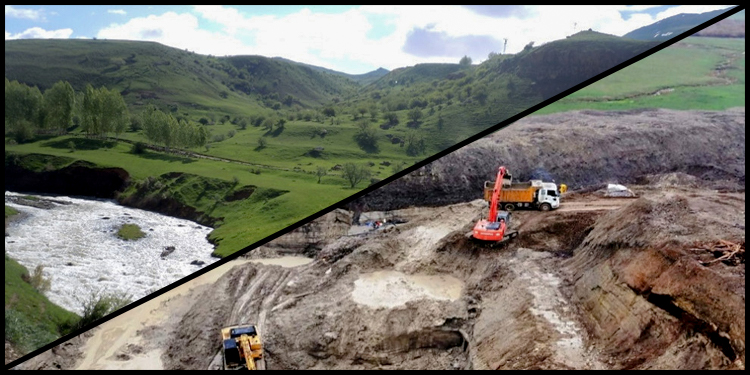BAKUR – It hosts large agricultural fields, pastures and springs, very fertile for livestock. It is one of the places where the Pearl Mullet fish, known as Van fish, lives. Zilan is also reach in resources such as minerals. The region, which has a history of thousands of years, has hosted many civilizations such as the Urartu, also known as the Kingdom of Urartu or the Kingdom of Van, a civilization which developed in the Bronze and Iron Age.
Urartu was an interesting civilization as it sprang from a confederation of kingdoms which had developed from the 14th or 13th century BCE onwards. A recognisable and independent state known as Urartu developed from the 9th century BCE which combined these smaller kingdoms, probably in response to an external threat from Assyria.
A continuation of the policies applied by the state to the region of Zilan is the construction of 4 HPPs. The first thing done when a HPP project begins is to force people out of their lands. The area where the Hydroelectric Plant will be located will end up deserted, no people, no animals, no agricultural lands. A first HPP project was launched in Zilan in 2014. The Plant construction was approved despite the objection of the villagers. It was stopped by the Council of State decision in 2015. Despite the decision of the State Council however, the HPP construction was restarted two months ago.
Speaking to ANF, Zilan Initiative Spokesperson Şahabettin Demir pointed out that agriculture and animal husbandry have come to an end due to the destruction caused by the hydroelectric power plant in Zilan. “Migration from the villages has started. We believe that this is the second massacre after 1930 in the Zilan Stream, where water once flowed from the highlands and all kinds of agricultural activities were carried out,” Demir said.
The works initiated by the government for the construction of a hydroelectric power plant in Zilan Stream in Erciş district of Van in 2014 were halted by a ruling of the Council of State following the application of environmental organizations and people living in surrounding villages. Despite the annulment ruling of the Council of State, the AKP government launched the project in Zilan Stream last year.
Natural disasters caused by the HPP construction have begun to be reported frequently. While mass fish deaths have occurred due to the closing of the dam shutters, agriculture and animal husbandry have terminated as the waters flowing from the plateaus were directed into the power plant. While there are 30 villages in the region which is remembered as the place where the 1930 Zilan Massacre took place, 10 villages have been adversely affected by the construction of the power plant. The villagers who no longer have a means of living due to the power plant have started to migrate from the region.
AGRICULTURE AND HUSBANDRY FINISHED
Demir revealed that the water level in Zilan Streeam dropped to 10 cm, leading to mass fish deaths. He noted that the water flowing from the plateaus was directed into the power plant, thus terminating agriculture and animal husbandry. “Our trial continues at the Council of State, and we will act again in the coming days after the final decision is made. The last expert report released by the Van Regional Administrative Court was a completely biased report. We objected to this. The Council of State reviewed our appeal positively. The Council of State had already found the report incomplete. With an environmental engineer and an archaeologist, we objected to this together. We asked experts from all branches pertaining to nature. We want experts such as fisheries, archaeologists, environmental engineers, agricultural engineers to be involved in the case. Our objection to the local court decision at the Council of State is a positive development, but not enough.”
VILLAGERS STARTED TO MIGRATE
Agriculture and animal husbandry, which are the only means of livelihood of the local people, has terminated due to the destruction of nature caused by the power plant, according to Demir, who continued, “Recently, migration has started in those villages. We believe that this is the second massacre after 1930 in the Zilan Stream, where water once flowed from its highlands and all kinds of agricultural activities were carried out. The villagers are now migrating. There has been a huge increase in migration in recent days. Families are now leaving Zilan. Once the Council of State overturns the decision, we will take action again and defend our lands and waters until the end.”




